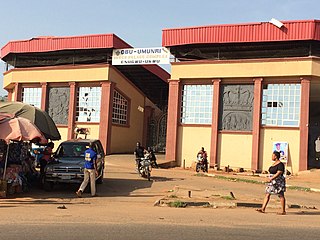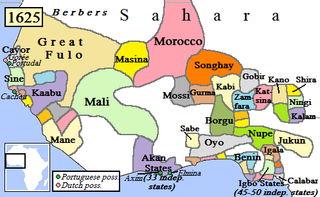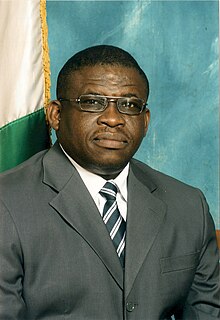Related Research Articles

Abia State is a state in the South-East geopolitical zone of Nigeria, bordered to the north and northeast by the states of Anambra, Enugu, and Ebonyi, Imo State to the west, Cross River State to the east, Akwa Ibom State to the southeast, and Rivers State to the south. It takes its name from the acronym for four of the state's most populated regions: Aba, Bende, Isuikwuato, and Afikpo. The state capital is Umuahia while the largest city and commercial centre is Aba.

Umuahia is the capital city of Abia State in southeastern Nigeria. Umuahia is located along the rail road that lies between Port Harcourt to its south and Enugu city to its north. Umuahia has a population of 359,230 according to the 2006 Nigerian census. Umuahia is indigenously Igbo.

Rivers State, also known as Rivers, is a state in the Niger Delta region of southern Nigeria. Formed in 1967, when it was split from the former Eastern Region, Rivers State borders includes; Anambra and Imo on the north, Abia and Akwa Ibom on the east, and Bayelsa and Delta on the west. The state capital, Port Harcourt, is a metropolis that is considered to be the commercial center of the Nigerian oil industry.

Enugu State is a state in the South-East geopolitical zone of Nigeria, bordered to the north by the states of Benue and Kogi, Ebonyi State to the east and southeast, Abia State to the south, and Anambra State to the west. The state takes its name from its capital and largest city, Enugu.
Okoh Ebitu Ukiwe is a retired Commodore in the Nigerian Navy who served as the de facto Vice President of Nigeria under military head of state General Ibrahim Babangida from 1985 to 1986.

Theodore Ahamefule Orji CON is a Nigerian Politician who is a former governor of Abia State, in southeast Nigeria, on May 29, 2007, and re-elected on April 26, 2011. He was formerly a career civil servant, and served as the Chief of Staff to Abia Governor, Orji Uzor Kalu.
Ekweremadu is a Nigerian politician and lawyer from Enugu State who has served in the Senate of Nigeria since May 2003. He is a member of the People's Democratic Party and was the Deputy President of the Nigerian Senate for three consecutive senate.
Ini is located in the south of Nigeria and is a local government area of Akwa Ibom State.
Osisioma Ngwa is a Local Government Area of Abia state of Nigeria. Its headquarters are located in Osisioma town.
Udi is a Local Government Area of Enugu State, Nigeria. Its headquarters is in the town of Udi on the A232 highway. The current Local government chairman is Hon Ifeanyi Agu.
Navy Captain Temi Ejoor was a Nigerian Military Administrator of Enugu State and then of Abia State during the military regime of General Sani Abacha.

Rear Admiral Allison Amaechina Madueke is a retired Nigerian naval officer. He was Chief of Naval Staff from 1993 to 1994, military governor of Anambra State from January 1984 to August 1985, and Imo State military governor from 1985 to 1986.

Enugwu Ukwu is a large town in Anambra State, Nigeria. Enugwu-Ukwu town is geographically situated on hilly terrain; thus it is named after its geographical topography. It is predominantly occupied by the Igbo people ethnic group of Anambra State. Most of its inhabitants are Christians. It is located in Njikoka Local Government Area of Anambra State. Major villages that make up the town include Uruokwe, Enu-Avomimi, Adagbe-Avomini, Umu-Atulu, Urualor, Akiyi, Avomimi, Awovu, Enuagu, Ire, Orji, Orofia, Osili, Umuakwu, Umuatulu, Umuatuora, Umuokpaleri, Uruekwo, Urukpaleke, Urunnebo, and Uruogbo.

Nigerian traditional rulers often derive their titles from the rulers of independent states or communities that existed before the formation of modern Nigeria. Although they do not have formal political power, in many cases they continue to command respect from their people and have considerable influence.
Events in the year 2011 in Nigeria. The year 2011 is a distinguishing year for Nigeria. The year entails several events that define the progress of the country and its future. These events include: the 2011 budget bill, the general election, and activities of the current government.

Eric Iheanacho "Acho" Nwakanma is a Nigerian politician, businessman and philanthropist, who served twice as the 4th and then the 6th Deputy Governor of Abia State, Nigeria on the platform of the Peoples Democratic Party (PDP), from 2006 to 2007 under Governor Orji Uzor Kalu and again under Governor Theodore Orji from 2010 to 2011.
Chamberlain Oyibocha Orovwuje, Ogurimerime I, was the Ovie of Agbon Kingdom from 1958 till 2012. He was also the former chairman of Delta State Council of Traditional Rulers. He ruled the traditional kingdom of Agbon for 54 years and clinched the title of the longest reigning monarch in Delta State.
The Waawa clan of Northern Igboland, also referred to as Ndi Waawa, Wawa People, are a unique sub-group of the Igbo people in Enugu and Ebonyi State, Nigeria, consisting of several communities, who all speak a unique dialect of Igbo called Waawa. The most notable among these are the Agbaja and Ngwo which consist of peoples between the wooded lands of Awka to the rocky valleys of Enugu. The Agbaja are made up of communities in present-day Ngwo clan, Udi, Ezeagu, Umulokpa, Igbo-Etiti, Oji River, greater Awgu, Odume, Ndiagbor, Nenwe, Mpu, Okpanku and Enugu East Local Government Areas. Other notable parts of the Waawa clan include Nkanu, Nsukka, Abia, Nike, Agbani, Owo, and other communities in Enugu State. The Waawa are most notably associated with Chief Onyeama's people from Eke, who was the paramount ruler of Agbaja in the early 20th century.
Mao Arukwe Ohuabunwa is a Nigerian politician, businessman and currently a serving Senator representing Abia North Senatorial District in the 8th National Assembly having served in the 4th and 5th National Assembly as Member representing Arochukwu/Ohafia constituency of Abia State under the People's Democratic Party between 1999 and 2007.
Nru Nsukka is a suburb located in Nsukka town. Nru Nsukka is one of the former old three autonomous communities: Mkpunanor, Nru and Ihe n'Owerre that made up the Nsukka urban area. Nru Nsukka having been upgraded to a suburban area was split into three newer autonomous communities with newly installed traditional rulers. Since 2018, the suburb is now made up of Iheagu Nru autonomous community with its traditional ruler as Sylvanus Arumah, Ezema ne Edem autonomous community with its traditional ruler as Linus.O. Atugwu and the youngest being Umuoyo Nru autonomous community with Paul Atanike as its traditional ruler elect.
References
- ↑ "Traditional Rulers and Council of Chiefs". Abia State. Archived from the original on 2010-09-11. Retrieved 2010-09-03.
- ↑ UBA AHAM/Enugu (1 January 2001). "Deposed". The News (Lagos). Archived from the original on 2012-10-16. Retrieved 2010-09-03.